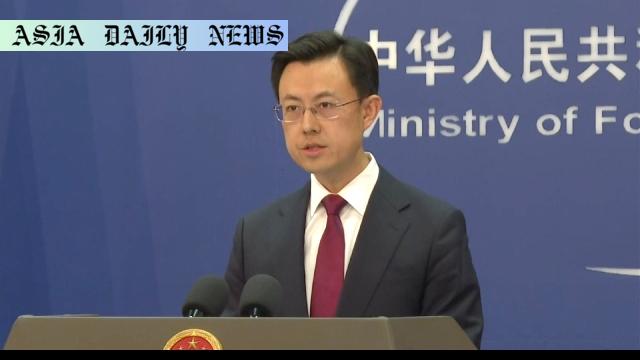Nuclear Disarmament: China urges US and Russia to lead efforts in reducing nuclear stockpiles and cutting military expenditures.
China urges the US and Russia to lead nuclear disarmament efforts.
US President Trump proposes arms reduction talks with key global powers.
China emphasizes the US has the largest military expenditure globally.
Beijing calls for responsible actions towards nuclear reduction.

The Global Need for Nuclear Disarmament
In a world where uncertainty continues to heighten geopolitical tensions, the issue of nuclear disarmament resurfaces as a global priority. On Thursday, US President Donald Trump proposed a multilateral initiative involving the United States, China, and Russia to reduce nuclear stockpiles. This comes amid growing concerns about the risks posed by large nuclear arsenals held by these superpowers and the urgent need to promote transparency and stability.
China’s Call to Action
China, through its Foreign Ministry spokesperson Guo Jiakun, explicitly called upon the United States and Russia to take the lead in efforts to disarm. Pointing out that these two nations possess the largest nuclear arsenals globally, Guo emphasized their “special responsibility” in setting an example for others to follow. This strategic move would create the conditions for other nuclear-capable nations to join the initiative.
The US Perspective: Military Budgets and Disarmament
President Trump’s statement also included a bold proposal to cut military budgets across the board, an effort to reappropriate resources for broader constructive objectives. However, Guo was quick to highlight disparities, including the United States consistently leading global rankings in military spending. This contrasts sharply with China’s approach, which aligns with its calls for prudence and moderation in defense expenditure.
The Challenges of Multilateral Disarmament
Despite promising rhetoric, multilateral nuclear disarmament remains fraught with challenges. Trust deficits, competing national interests, and deeply engrained security paradigms complicate matters. Historically, efforts like the START treaties between the US and Russia exemplify the arduous pathway toward agreements, even when only two nations are involved. Bringing China into the equation could add complexities, but it also offers opportunities for creating a meaningful and collaborative framework for global nuclear security.
Why Collaboration Matters
For effective global disarmament to occur, a collaborative approach is indispensable. The three nations discussed collectively hold the majority of the world’s nuclear arsenal. Their agreement and cooperation could set a powerful precedent. Leading by example, the US, Russia, and China could encourage smaller nuclear powers such as the UK, France, and India to commit to gradual reductions, thereby significantly diminishing nuclear dangers worldwide.
Final Thoughts
While nuclear disarmament is a critical step toward ensuring global peace, bridging the gap between proposals and actionable results requires significant political will. The stakes are high, and the opportunity to build a safer world is too valuable to ignore. As these three nations deliberate their strategies, the international community must also support and encourage steps toward a nuclear-free world.
Commentary
The Importance of Leadership in Nuclear Disarmament
The issue of nuclear disarmament is not merely a topic of international diplomacy, but a matter of humanity’s future. It is promising to see world leaders, including US President Donald Trump, taking steps toward addressing the critical need to curtail nuclear weapon stockpiles and related expenditures. However, the challenges that lie ahead in achieving tangible outcomes cannot be ignored.
China’s Role as a Strategic Actor
China’s stance is both pragmatic and strategic. By urging the United States and Russia to take the lead, Beijing highlights the disproportionate share of global nuclear arsenals held by these two nations. This approach shifts the responsibility toward the largest contributors to the nuclear arms race while positioning China as a supporter of equitable disarmament. It remains to be seen, however, whether China’s calls for moderation will translate into concrete actions.
The Path Forward
True progress in nuclear disarmament will require more than just rhetoric. Trust-building measures, transparent dialogues, and verifiable commitments are necessary to move forward. While it is encouraging to see such discussions being initiated, sustained international cooperation is the only way to overcome the deep-seated challenges associated with this issue.
Ultimately, the journey toward a nuclear-free world is one that demands sacrifice, innovation, and a shared vision. If the United States, Russia, and China can rise above their immediate geopolitical rivalries, they have an unprecedented opportunity to set a historic example for the world.


